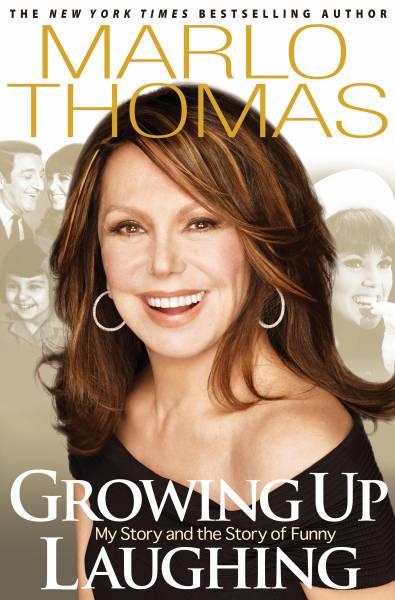Barnes & Noble Lincoln Triangle
1972 Broadway at 66th St.
Thursday, November 4, free, 7:30
212-595-6859
www.marlothomas.aol.com
www.hyperioncatalogs.com
In the first chapter of her entertaining memoir, GROWING UP LAUGHING: MY STORY AND THE STORY OF FUNNY (Hyperion, September 2010, $26.99), Marlo Thomas writes about how her family “celebrated everything.” The book itself is a celebration as well: of her life and career; of her father, famous actor and comedian Danny Thomas; and of comedy in general. The star of the early feminist television series THAT GIRL and the creator of FREE TO BE . . . YOU AND ME, which has helped raise several generations of children by teaching kids and parents about compassion, individuality, tolerance, friendship, and the value of family, Thomas has been one of America’s genuine sweethearts for some fifty years. In the book, Thomas, who has been married to talk-show legend Phil Donahue for thirty years, alternates between personal chapters and interviews about comedy with some of her famous friends, including Don Rickles, Tina Fey, Conan O’Brien, Kathy Griffin, Stephen Colbert, Elaine May, Alan Alda, Whoopi Goldberg, and Chris Rock, who all help tell the “story of funny.” Thomas recently talked with twi-ny about the book and her career as she continued her whirlwind promotional tour, which brings her to the B&N at Lincoln Triangle on November 4 at 7:30 for a reading, discussion, and signing.
twi-ny: You’re used to being the one interviewed, but in your new book, you interview some of your favorite comics, including Jerry Seinfeld, Billy Crystal, Robin Williams, Joan Rivers, and Lily Tomlin. How does it feel to be on the other side of the table, asking the questions?
Marlo Thomas: It was a lot harder and actually more interesting than I expected. I’m certainly familiar with the interview dynamic, having sat for so many of them throughout the years; and because many of my interview subjects in the book were already friends of mine, I instantly felt comfortable with them. But what I learned quickly was how important it is to thoroughly prepare going into an interview — even with someone you think you know. I read their books, watched their specials, even though I’d seen many of them before, so that when we sat down to talk I had a lot of background in my head, not just a lot of questions — which I think makes for a better conversation and leads to a better interview. It was also challenging for me to keep guiding the conversation to where the funny was.
These are interesting people that are great to talk with on a variety of subjects, but since the book is about laughter I had to stay on topic. Luckily, all of my subjects are famously funny people, so they enjoyed exploring the area. But I know I’ll never again sit for an interview without being acutely aware of the hard work that’s going on on the other side of the table.
twi-ny: You write that GROWING UP LAUGHING is your “first and only memoir,” implying that this public examination of your life is not something you’ll be doing again. Was it difficult to open up about your life and share so much of yourself?
MT: I’ve always believed that unless you’re one of those people who have lived more than one kind of life — like Ted Turner or Grace Kelly — or unless you live to an unusually old age — like George Burns — one memoir is pretty much all you need to tell a life story. And as I say in my prologue to GROWING UP LAUGHING, the stories I tell in the book have been humming in my head all my life, so I feel wonderfully satisfied at having written them down at last.
But the life of an entertainer or any public person is no different from anyone else’s in that we’ve all lived through experiences that are painful or difficult or simply sad to recall, and so it was occasionally challenging for me to relive some of those moments in my book — particularly the death of my father. But as in acting, I wanted to create as complete and honest a picture as I could of my “character” — which in this case happened to be the real me. Fortunately, the concept for the book permitted me to take a break from my own story from time to time and explore the lives of these wonderful comedians and get some great laughs along the way.
twi-ny: In addition to being about your life and your family, your book is about comedy in general. How do you think the state of comedy has changed, if at all, since your father’s heyday? And if it has changed, is it for the better?
MT: Comedy is always changing as times and taboos change but what doesn’t change is how important laughter is to our lives. It can be a release of tensions. It can be a healing from pain. And nothing brings people together better than laughter. It is deliciously contagious. When I asked Jerry Seinfeld about all the different styles of comedy and how it changes from generation to generation, he likened it to a perfume counter at a department store — different people like different smells, and that’s what makes comedy so personal. Chris Rock told me that he can sit at the computer for hours on end watching clips on YouTube of legendary comics from all eras — from Lenny Bruce to Richard Pryor. To me, that says it all about the timelessness — and durability — of laughter.

